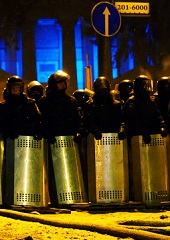U.S.-Brazil: The Battle Over Cotton Subsidies
Can Brazil retaliate and still win the match?
February 6, 2014

The U.S. government is dead set against India and other governments around the world providing financial support to their poor farmers.
At the same time, the United States is once again squaring off with Brazil, in another round of the long running “cotton dispute” between the two nations over U.S. subsidies.
The U.S. government’s strategy of non-compliance with WTO rules against those subsidies has a clear goal. In soccer terms, it seeks to compel Brazil to accept the consolation match – rather than raise the champion’s trophy by winning U.S. compliance.
A little bit of history is in order. In 2005, in a decision hailed widely at the time, the WTO’s Dispute Settlement Body (DSB) ordered the U.S. government to eliminate its cotton production subsidies as well as its agricultural commodity export guarantee programs.
The United States appealed, but eventually lost the case altogether in 2009 when the WTO arbitrator approved the largest trade sanctions in history.
A sting to the United States
More importantly, the arbitrator ruled that Brazil could impose so-called “cross-retaliation measures.” That allowed Brazil to impose countermeasures in other sectors, not limited to agriculture.
This ruling came across as a true sting to the United States. The WTO’s decision marked the first time that a major emerging market country was entitled to implement such an international trade remedy to secure effective leverage against the United States.
The decision represented a resounding victory for developing countries, who by and large oppose what they consider a one-sided U.S. agricultural policy. This issue also plays an important role in the context of the ongoing Doha Round negotiations.
Trying to soften up Brazil
Given the stakes involved, the U.S. government quickly moved toward negotiations with Brazil to dodge these sanctions. In early 2010, a temporary bilateral agreement was negotiated. The United States agreed to pay the Brazilian Cotton Institute $147.3 million a year, an amount based on the WTO arbitrator’s calculation of average annual damages to Brazilian cotton growers.
In return, Brazil gave the United States more time to bring U.S. agricultural policy into compliance with WTO rules. This pragmatic deal also opened the door to increasing high-level bilateral meetings between the presidents and leading officials from both nations.
In early 2013, President Obama invited his Brazilian counterpart for a state visit, an event that practically committed the two parties to finding solutions to their intractable commercial clashes, including the cotton dispute.
The best-laid plans
Then, something happened on the way to this tentative engagement of the two heads of state. Edward Snowden’s press releases, televised by the popular Brazilian television program Fantastico, in early September of 2013 indicated that the U.S. National Security Agency had been tapping President Dilma’s telephone in a broadly framed program of cyber-espionage.
Dilma protested, but Obama did not offer a public apology. Nor did his administration demonstrate interest in Brazil’s offer to negotiate over cyber-based collective security. Dilma canceled her visit and warned the United States:
Illegal surveillance practices intercepting the communication and data of citizens, companies and members of the Brazilian government constitute a serious affront to national sovereignty and individual rights, and are incompatible with democratic cooperation between friendly nations.
In the aftermath, Obama did not repent. Dilma downgraded bilateral relations and joined hands with the German Chancellor Angela Merkel at the United Nations in denouncing the NSA spying program.
Screw the deal
Adding insult to injury, the U.S. Secretary of the Department of Agriculture (USDA), Tom Vilsack, visited Brazil in August 2013 – just prior to the reports of U.S. spying. He alerted the Brazilian government that the agreed-upon payments to Brazil would stop.
As justification, he pointed to money being tight due to the U.S. budget “sequester” and also blamed Congressional inaction on the U.S. farm bill. Weeks later and without any apparent official notification, the United States violated the 2010 bilateral accord by stopping payments to the Brazilians.
Left with an obstinate U.S. Congress, Brazil must now decide what it wants to do. Its main options are to drop the case altogether or impose retaliations to force U.S. compliance.
To obtain fair compensation for the U.S. violation, Brazil would likely aim at breaching the intellectual property protections of a set of U.S. biotechnology, information technology and pharmaceutical firms. Affected firms could include Monsanto, Microsoft and Abbott Laboratories, as well as Bell Helicopters, Lockheed Martin and Texas Instruments.
In the past, Brazil has demonstrated a prudent disposition to leverage such intellectual property rights (IPR) sanctions in order to obtain favorable results from pharmaceutical companies.
Playing hardball with Washington
In the late 1990s, the private sector friendly government of President Fernando Henrique Cardoso effectively threatened the imposition “compulsory licensing.” That is allowed under the WTO’s Trade-Related Aspects of Intellectual Property Rights (TRIPS) Agreement. Brazil used this position to drive down the high prices charged by leading producers of drugs used in the AIDS “cocktail” treatment, including Merck and Abbott Laboratories.
The odds are that Brazil, aided by the WTO decision, will not shrink back. To the contrary, the Dilma government poses a palpable threat of imposing stiff trade retaliations on U.S. imports and intellectual property.
The key question is this: Can Brazil implement these retaliations – and still win the match, without shooting itself in the foot?
Some trade analysts say yes. They believe that Brazil can shield its own economy and force the United States to give in if it moves forward with retaliations.
How dare they?
To be sure, U.S. policymakers are accustomed to having their way and winning any such duels. However, the outcome with Brazil as an opponent is not so clear.
As things stand, the cotton dispute between Brazil and the U.S. seems headed for a penalty shoot out – and Brazil now has the home field advantage. Under WTO dispute resolution procedures, Brazil could enact retaliations that would force the U.S. government to defend the new crop insurance schemes at a compliance panel. In such a scenario, the United States would face a great risk of losing again.
Millions of small and large cotton farmers throughout the developing world – including in the so-called “Cotton-4” countries of Benin, Burkina Faso, Chad and Mali – are awaiting the next U.S. move with bated breath.
That is just one more reason why the United States may want to rethink its current inflexible stance in the trade game with Brazil.
Takeaways
The US may want to rethink its current inflexible stance in the trade game with Brazil.
The US wants to compel Brazil to accept what soccer calls a consolation match in the field of cotton.
The cotton dispute between Brazil and the US is headed for a penalty shoot out. Brazil has the home advantage.
Millions of cotton farmers in the developing world are awaiting the next US move with bated breath.
In 2005, the WTO ordered the US government to eliminate its cotton production subsidies.
For the first time, an emerging market country secured tough leverage against the United States.
US policymakers are accustomed to having their way. The outcome with Brazil as an opponent is not so clear.

